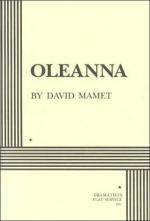|
This section contains 4,277 words (approx. 15 pages at 300 words per page) |

|
SOURCE: "Sex, Power, and Pedagogy in Mamet's 'Oleanna' and Ionesco's 'The Lesson'," in American Drama, Vol. 5, No. 1, Fall, 1995, pp. 36-50.
In the following essay, Foster compares David Mamet's Oleanna and Eugène Ionesco's The Lesson, concentrating on how the former dramatizes the ambiguities of sexual politics and conflict.
The veneer of realism in David Mamet's plays can tempt audiences to ask questions or make assumptions about the characters' affiliations, values, and motives that the dramatist has deliberately left vague. The recent controversy over Oleanna is a case in point. Theatre critics and audiences, filling in the gaps in Oleanna with yesterday's headlines, have overdetermined motives and ideological positions that Mamet constructs as richly ambiguous. Seen only in light of the Anita Hill-Clarence Thomas hearings and their aftermath, the play becomes an ephemeral contribution to the current conversation about sexual harassment and political correctness and as such can function...
|
This section contains 4,277 words (approx. 15 pages at 300 words per page) |

|


